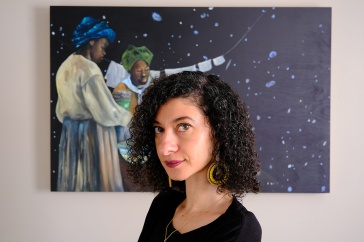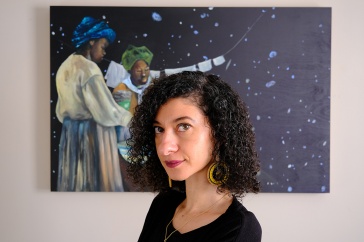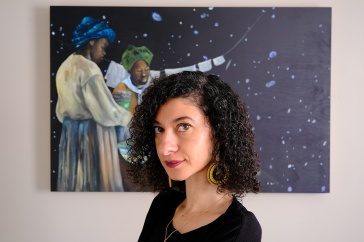
Chanda Prescod-Weinstein, assistant professor of physics and core faculty in women’s and gender studies at UNH, is featured in Nature journal’s “Nature’s 10,” a list of people who had a role in some of 2020’s most significant moments in science. The leading science journal called Prescod-Weinstein, a theoretical cosmologist and particle physicist who studies dark matter, “a force in physics” who “pursues the nature of dark matter while also confronting racism in science and society.”
On June 10, 2020, Particles for Justice, a group Prescod-Weinstein co-founded in 2018 to fight systemic sexism in academia, mounted a #strike4blacklives response to systemic racism and violence against Black people in conjunction with the #shutdownSTEM and #shutdownacademia initiatives that day. One of more than a dozen organizers of that day, she drew motivation from “the protestors responding to the unjust killings of Ahmaud Arbery, Breonna Taylor and George Floyd, plus a pandemic that has disproportionately killed Black and brown folks. I felt frustrated that as the bodies piled up, physicists were continuing to do business as usual, as if everything was normal,” she says.
The impact of #strike4blacklives was widespread: Major academic publishers and associations representing hundreds of thousands of scientists paused their activity and used the day to reflect and take action on fighting anti-Black racism. But Prescod-Weinstein didn’t take a victory lap. “I think it’s an outrageous tragedy that so many people had to suffer and die before we thought we could successfully galvanize academics in the way we did this year,” she says.
The Nature distinction follows several others that recognize Prescod-Weinstein’s contributions to science and social justice, including the American Physical Society’s (APS) Edward A. Bouchet Award and Vice.com’s Humans of 2020.
A theoretical particle cosmologist, Prescod-Weinstein studies dark matter, work that’s at the intersection of physics and astronomy. She is currently principal investigator on three grants, including one from the National Science Foundation to study “making galaxies out of an (ultra)light invisible matter halo.” She is the organizer of a conference on dark matter at the Aspen Center for Physics and serves as a cosmic probes of dark matter topical convener for the Snowmass 2021 Particle Physics Community Planning process. Prescod-Weinstein is also active in research in Black feminist science, technology and society studies.
In addition to publishing research in peer-reviewed journals, Prescod-Weinstein writes regularly for more popular media, including New Scientist and Physics World, where she is a contributing columnist. Her book, The Disordered Cosmos: A Journey into Dark Matter, Spacetime, and Dreams Deferred, will be published in March 2021.
In 2016, when she was a postdoctoral researcher at UNH, Elena Long, now an assistant professor also in the physics department, was named to Nature’s 10 in recognition of her pathbreaking efforts to make the field of physics more inclusive of people from sexual and gender minorities.
-
Written By:
Beth Potier | UNH Marketing | beth.potier@unh.edu | 2-1566



















































